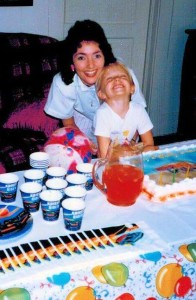I wrote this poem in two stages. The first part is about the horrific emotions I felt, and the state of mind I was in, almost immediately. The beginnings of this poem emerged within a few weeks of Christian’s death, and for months, I felt the painful depths of each and every word I wrote.
It wasn’t until I was on the edge of life and death, or as I call it, “the living dead” that I could not hang on anymore. I begged my God to take me home. It was in God’s reply back to me that showed me a future, somewhere out there on that dark horizon. And even though, at the time, I wasn’t sure how I would emotionally arrive at it, I could, at least see where my journey was taking me. So, I wrote down the words of God. After doing so, I could see that God was making a promise to me, to hold on, in time I would be healed of the terrible grief I experienced, and even better; that a powerful transformation would occur in my life. Is all I had to do was to keep an open and loving heart, trust and follow the path and road signs (words) God laid out for me, in the second part of my poem.
By the end of it all, I could see through the illusion of death and that life just does what life does. It’s not personal. By the grace of God, I learned to have grace myself, and see that, although loss is very sad, there is no reason to fear separation from another; for in an infinite reality, we are, and always will be connected. We are infinite beings! It is just the illusion of separation of ourselves in this life, that confuses us so much.
(For my Beloved Christian, who left this realm, March 31, 2010)

Grieving a loved one
Death’s Painful Sting by Jade
How cold and cruel is death’s painful sting,
As tears falls from swollen eyes.
Then tales of separation,
Begin to speak their lies.
They tell you that you’ve lost,
The one you love so much.
Forever to be gone,
Coldly taken by death’s touch.
Continue reading →
 IF I NEVER CARVE A PUMPKIN
IF I NEVER CARVE A PUMPKIN So I’ll honor our traditions
So I’ll honor our traditions





